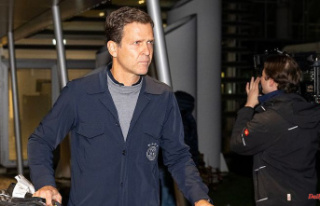Germany wants to help South Africa to free itself from the dependence on coal. Meanwhile, German utilities are buying hard coal here to replace Russian gas.
A skill that is currently particularly required of the minister responsible for both the economy and climate protection: the balancing act. And since Robert Habeck has a lot of practice - at least since the green politician was in Qatar to get a liquid gas deal on the way.
In Johannesburg, the third stop on his trip to Africa, where he will open a German-African business conference, this ability will be in demand again: Germany wants to support South Africa with the energy transition. At the same time, German companies are buying in large quantities of dirty coal. This is not without a certain irony. After all, the federal government - Habeck's Greens made sure of that - decided to get out of coal. In North Rhine-Westphalia, production should end in 2030, in eastern Germany by 2038 at the latest.
However, the Russian war of aggression in Ukraine is forcing the traffic light coalition to be extremely flexible when it comes to energy policy. The EU is boycotting Russian coal and, more recently, Russian oil, while the Kremlin has halted gas supplies through the Nord Stream 1 Baltic Sea pipeline. In the short term, fossil energy from Russia cannot be replaced by renewables. So in Germany, the lifetimes of nuclear power plants are being extended, Chancellor Olaf Scholz is offering Senegal help for the development of a gas field, liquid gas is to be supplied from the USA and the Middle East, and the infrastructure for this is being built at record speed by German standards.
And a lot of coal comes from South Africa. Exports to Germany and the EU have shot up - somehow the missing energy from Russia has to be replaced. For the South African coal lobby, which is well networked in politics, this is a steep template.
The country with its 60 million inhabitants is rich in coal deposits and is finding it extremely difficult to free itself from its dependence on fossil fuels. Almost 90 percent of the energy consumed in South Africa is generated from coal, including almost all of the electricity required. In addition, coal is liquefied to obtain mineral oil. Almost a quarter of all gasoline and diesel comes from this process, which South Africa has relied on since the sanctions imposed because of apartheid. It is estimated that around 200,000 jobs depend on coal.
That explains why the country is so glued to coal for energy generation despite climate change. This is not only a problem with regard to the environment and climate. For years there has been a daily power outage somewhere in South Africa. Blackouts are normal.
This is mainly due to the state electricity company Eskom, which is riddled with corruption and incompetence and has a debt of around 25 billion euros. The company lacks the money to buy diesel for turbines that will be used when its coal-fired power plants fail. This is often the case. Because many are ailing and prone to failure. One solution: announced, preventative power outages to prevent spontaneous blackouts. South Africans can use an app to find out where, when and for how long the electricity will be switched off - and can thus prepare for it. But that doesn't change the fact that the electricity keeps failing unplanned.
This is not only unpleasant for South Africans sitting in the dark. The energy crisis is massively hampering economic development. That is why the government has started to develop an eco-alternative to coal and has launched an investment plan. Germany has made more than one billion euros available for the South African energy transition. The money is part of the new energy partnership with South Africa, which has also been joined by the UK, US, France and the EU.
The goal is a faster and socially just transition in South Africa to a climate-friendly economy. A total of $8.5 billion in support is planned over the next five years, much of it in the form of loans. The partners also want to mobilize private investments and funds from the World Bank.
Germany and South Africa are cooperating, among other things, in the construction of solar and wind power plants and lines for the transmission of green electricity. These investments should create new jobs, especially in the coal regions. Programs for the retraining of former coal workers and for training in the professions urgently needed in the energy transition are also being funded.
The conditions for green electricity are ideal in South Africa - there is a lot of wind, many hours of sunshine and plenty of space for wind turbines and solar parks. However, the drive towards the energy transition has only just begun. Germany is much further along, but with the war in Ukraine there are obstacles. Habeck will have plenty of opportunity to stay in practice.












